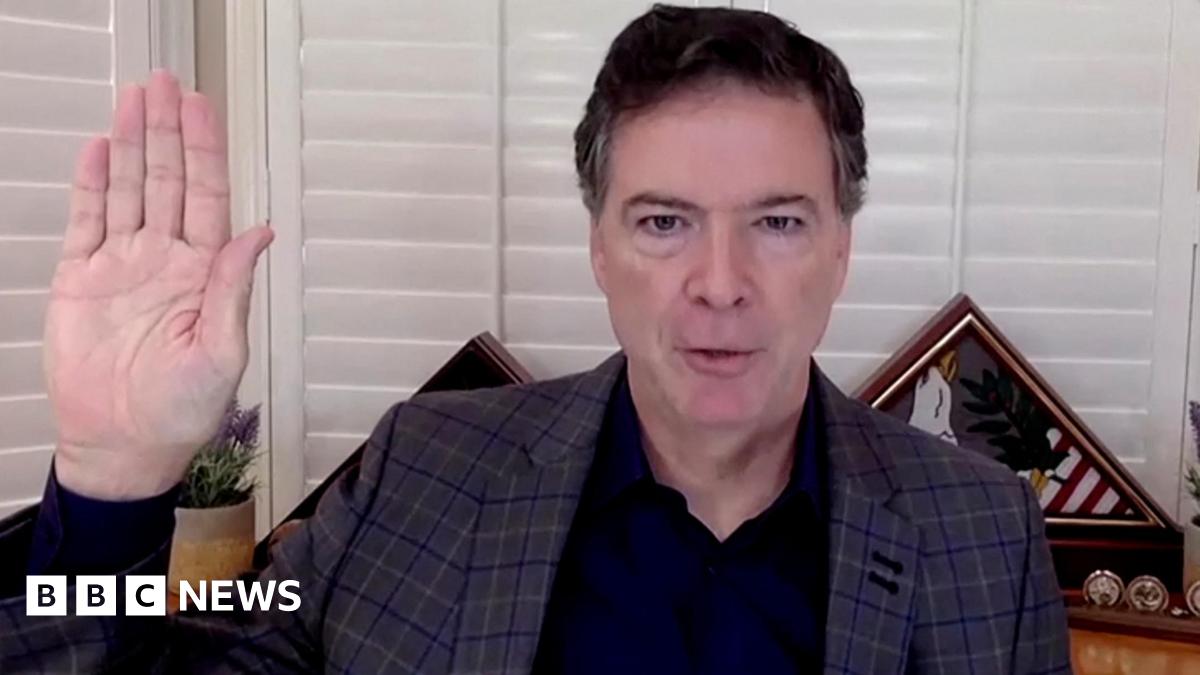
Former FBI boss James Comey has been indicted on alleged crimes "related to the disclosure of sensitive information", the US justice department says
He is charged with one count of making false statements and another of obstruction of justice
US Attorney General Pam Bondi says "no one is above the law" after the indictment was announced
Earlier this week, Trump posted on Truth Social that Comey and several other political opponents were "guilty as hell" and "JUSTICE MUST BE SERVED"
Trump hailed news of the indictment in a social media post
In a video statement, Comey says he is innocent and "let's have a trial"
Comey was fired by Trump during his first presidential term in 2017, and the two have exchanged public insults for years since then
This video can not be played
Watch: 'I'm not afraid', says James Comey after indictment
Edited by Helen Sullivan
This live page is pausing for a while.
A reminder if you're just joining us: former FBI director James Comey has been indicted by the Justice Department on two charges over testimony he gave to Congress in 2020, becoming the first former FBI director to be indicted for an alleged crime. Comey responded to the indictment in video posted on Instagram, saying "fear is the tool of a tyrant" and that he is not afraid: "I'm innocent, so let's have a trial"
You can read the full story here.
Comey's arraignment – where charges are formally read out in front of a defendant in court – has been set for the morning of 9 October in Alexandria, Virginia at 10am local time, the BBC's US partner CBS reports.
Comey's attorney, Patrick J. Fitzgerald, issued in a statement after news of the indictment saying: "Jim Comey denies the charges filed today in their entirety. We look forward to vindicating him in the courtroom."
We mentioned earlier that the government has already investigated Comey this year, for a photo of seashells spelling out "8647," which Republicans had considered an incitement to violence against Trump.
In a May appearance on The Late Show With Stephen Colbert, Comey blamed his wife for his since-deleted seashell photo.
He said he was on a walk with his wife when he spotted the seashells in the sand. They believed it was a reference to restaurant and bar lingo, but Comey added that it might also be a "a clever political message".
“She said, ‘You should take a picture of it,’ I said, ‘Sure.’ Then she said, ‘You should Instagram that,’ and then boom!” Comey told Colbert.
Trump told Colbert that he hoped that after being interviewed by the Secret Service that would be "the end of it".
Elsewhere in the interview, he discussed the clearing out of the FBI under new director Kash Patel and how agents had been re-assigned to help Immigrations and Customs Enforcement (ICE).
Here is a recap of the main developments following news of former FBI director James Comey's indictment:
Former prosecutor Laurie Levenson has just spoken to the BBC and says Comey's indictment is "unprecedented" and "troubling".
"It is troubling because the prior prosecutor who evaluated this case said they did not have evidence to prove it," she said.
"Everything about this smacks of vindictive prosecution."
Levenson says Comey's indictment appears "retaliatory" and "tit-for-tat at a very high level", going further than even President Richard Nixon's political "enemies list".
When asked what this means for the safeguards against White House interference with the Department of Justice, Levenson says: "That wall has completely collapsed and it collapsed with this case," she said.
If convicted, Comey could face prison time, but Levenson says the challenge for prosecutors is to prove that Comey's statements to Congress in 2020 were false.
"Especially when you take into account what James Comey was thinking and what his intent was at the time," she said
"Even if James Comey got things wrong, that doesn't mean he knowingly or intentionally lied to Congress."
Levenson says it's still unclear what evidence was presented to the grand jury that made them agree to go ahead with the indictment.
Since the 1970s, the justice department has sought to position itself as mostly independent from the president.
But Trump tested that norm.
Early in his first term, he fired Attorney General Jeff Sessions, for recusing himself from an investigation into Russian meddling in the 2016 election.
Then, in the waning days of the term, another attorney general, William Barr, resigned after pushing back against Trump's false claims of widespread fraud in the 2020 election.
During his 2024 campaign, Trump promised to seek revenge against many of his perceived political enemies – including former President Joe Biden – and others who have opposed him.
He has revoked the security clearances that provide access to classified material of several officials. He has fired several prosecutors who worked for Special Counsel Jack Smith on criminal probes against him.
Trump has also taken actions against law firms with attorneys who were involved in investigations into allegations against him, including the investigation that employed former Special Counsel Robert Mueller, who looked into allegations of Russian interference in the 2016 election.
Comey's indictment charges that he lied to a congressional committee when asked about leaks to the press about that Mueller's investigation. Sakshi Venkatraman
Sakshi Venkatraman
Live reporter
Earlier this week, Trump posted to Truth Social calling for legal action against Comey and others.
A few days later and an indictment has dropped.
This is not normal, a legal expert tells me.
"It's almost never been done before for a president to target people in this way," University of Richmond legal scholar Carl Tobias says.
The Justice Department typically operates independently of the White House, not at the behest of one particular political party, he said. It's why FBI directors' terms are 10 years – transcending who is in the Oval Office.
"It's troubling for the president to explicitly say that he wants particular people who he considers his political enemies to be prosecuted," Tobias said. "It's not in the tradition of the Department of Justice or the FBI to target people – unless they have committed a serious crime."
He said a federal judge may find the case against Comey "dubious" for that reason.  Sakshi Venkatraman
Sakshi Venkatraman
Live reporter
The case against James Comey may be seriously threatened by Trump's Truth Social posts, a legal expert tells me.
"There's a possibility that the president tweeting could undercut this indictment," said Carl Tobias, a federal courts expert at the University of Richmond School of Law. "It's inappropriate for the president to comment on somebody's guilt. Everyone is entitled to their day in court."
What also complicates things is the recent resignation of Erik Siebert, former US Attorney for the Eastern District of Virginia, who quit under pressure from Trump. After Siebert failed to bring charges against Trump opponents like Comey and New York Attorney General Letitia James, Trump said, "I want him out."
"It's troubling," Tobias said of Trump's "instigation" of this case.
James Comey's lawyer Patrick J Fitzgerald has issued a short statement to media.
Jim Comey denies the charges filed today in their entirety. We look forward to vindicating him in the courtroom."
Patrick J Fitzgerald
Annmarie McAvoy from the Columbia School of International Public Affairs tells BBC News that it's "certainly a first" for someone "at that level" to be indicted.
But she says there have been other indictments against officials in the past for lying to Congress and for obstruction of justice.
Two senior officials from Trump's first term – Steve Bannon and Peter Navarro – were convicted and sent to prison for not complying with congressional subpoenas.
McAvoy also highlights the ticking clock that explains why Comey was indicted this week.
A statute of limitations would have expired on 30 September, five years after Comey addressed Congress. After that time period, charges could no longer be brought.
"So they got in just in the nick of time before it would have been time barred," McAvoy said.
Earlier, we told you about Lindsey Halligan, the federal prosecutor who brought the charges against Comey.
She was stepping in to a role vacated last week by Erik Siebert, who resigned. Trump had been pressuring him to leave after his criminal investigation into New York Attorney General Letitia James did not bring about any charges against one of Trump's major political foes.
Trump told reporters: "I want him out.”
Halligan had never worked in a prosecutor's office and, before working for Trump, she handled insurance claims at a law firm in Florida.
Read more: US prosecutor resigns after Trump says 'I want him out’
This video can not be played
Watch moments from James Comey's 2020 hearing at heart of indictment
The indictment against James Comey relates to statements he made to Congress in 2020.
Specifically, he is accused of making "false statements within the jurisdiction of the legislative branch of the United States government" when he testified during a Senate Judiciary Committee hearing on 30 September 2020.
You can watch some moments from that testimony in the video above. Kwasi Gyamfi Asiedu
Kwasi Gyamfi Asiedu
Live reporter
We just heard Comey mention his family, and talk about fear being "the tool of a tyrant".
Two months ago, in July, his daughter Maurene Comey was fired from her role as a federal prosecutor in the Southern District of New York. According to media reports, she was given no reason for being removed from the office where she had worked for 10 years.
The day after, Maurene Comey, who worked on the cases against sex offender Jeffrey Epstein, his accomplice Ghislaine Maxwell, and hip hop mogul Sean "Diddy" Combs, told former colleagues that "fear is the tool of a tyrant, wielded to supress independent thought".
Since Trump returned to office, the justice department has been firing prosecutors who worked on cases that angered the president, including a special counsel investigation of Trump's alleged involvement in the 6 January 2021 capitol riots.
Earlier this month, Maurene Comey sued the Trump administration over her dismissal.
This video can not be played
Watch: 'I'm not afraid', says James Comey after indictment
Comey has spoken. The former FBI director posted a video to Instagram asserting that he is innocent and comparing Trump to a "tyrant".
"My family and I have know for years that there are costs to standing up to Donald Trump," he said. "We will not live on our knees."
He said that "fear is the tool of a tyrant", and that he is not afraid. Though his "heart is broken" for the justice department, he said he still has faith in the judicial system.
"I'm innocent," he said. "So let's have a trial."
This video can not be played
James Comey is a 'bad person', says Trump hours before indictment
Hours before news of Comey's indictment, Trump spoke to reporters at the White House and called the former FBI director "a bad person".
When asked if an indictment of Comey was imminent, the president said he was leaving that decision to Attorney General Pam Bondi and her team.
"They’re going to make a determination. I’m not making that determination. I think I’d be allowed to get involved if I want, but I don’t really choose to do so," he said.
"I have no idea what's going to happen."
As part of Comey’s ongoing feud with Trump, he published several claims about the once and current president in his 2018 book.
He likened Trump to a mob boss and detailed how Trump had focused on claims that he consorted with prostitutes in Moscow.
In an interview with ABC News to promote his book, Comey said Trump was "morally unfit" to be president.
Trump at the time said that Comey was an "untruthful slime ball". Anthony Zurcher
Anthony Zurcher
North America correspondent
The other shoe has dropped. Less than a week after Donald Trump fired off a Truth Social post specifically calling for a handful of his critics to be prosecuted, one of those targeted – James Comey – has been indicted.
It doesn’t take much to connect the dots, even if Trump’s justice department insists there is a solid case against the former FBI director and that this is an example of the powerful being held to account.
If there had been anything left of the once-strong firewall between the department and the White House – long considered sacrosanct by presidents of both parties – it is now gone.
The Comey case is also poised to unearth long-buried drama from the Russian election-meddling investigation of Trump’s first term, even though the perjury and obstruction charges – which relate to congressional testimony about a leak to a news outlet – are quite tangential and small-bore.
Trump and his supporters are sure to treat the prosecution of Comey as an avenue to undermine the credibility of the entire Russia investigation. While that probe found ample evidence of attempts to meddle in the 2016 presidential election, it produced no concrete evidence tying Trump directly to those efforts.
Perhaps the biggest question hanging over all of this is whether this is just an individual event – a move that might placate a clearly angry president – or a sign of more prosecutions to come. Ali Abbas Ahmadi
Ali Abbas Ahmadi
Live reporter
The Secret Service launched an investigation into Comey earlier this year after he shared then deleted a social media post with seashells spelling out "8647", which Republicans regarded as an incitement to violence against US President Donald Trump.
Comey had posted the photo to Instagram with the caption: "Cool shell formation on my beach walk."
The number 86 is a slang term whose definitions include "to reject" or "to get rid of", according to the Merriam-Webster dictionary, which also notes that it has more recently been used as a term meaning "to kill".
And Trump is the 47th US president.
Comey deleted the post, saying in a follow-up that he "assumed [the sea shells] were a political message".
"I didn't realise some folks associate those numbers with violence," he added. "It never occurred to me but I oppose violence of any kind so I took the post down."
But Trump argued that even "a child knows what that meant".
Read more: Ex-FBI boss James Comey investigated for seashell photo seen as threat to Trump
In order for the charges to be filed against Comey, federal prosecutors had to convince a grand jury that there was enough evidence against him to possibly lead to a conviction.
A grand jury is a group of citizens set up by a prosecutor to determine whether there is enough evidence for charges to be filed. In legal terms, it determines whether probable cause exists to believe a crime has been committed.
Grand juries do not decide if an accused person is guilty or not.
After they okay an indictment, the case is tried before a jury of peers in court that makes a verdict and can convict a suspect.
In the case against Comey, the grand jury was seated in Virginia, where the former FBI director resides.
The Justice Department asked a grand jury to consider three charges against Comey, but the the jury could only agree that two of them were backed by enough evidence to be tried in court.
The third count was another charge of making false statements.
These statements related to Comey telling the Senate Judiciary Committee that he did not remember “being taught” of an unnamed person's “approval of a plan concerning” another person in the 2016 presidential election.
Copyright © 2025 BBC. The BBC is not responsible for the content of external sites. Read about our approach to external linking.
